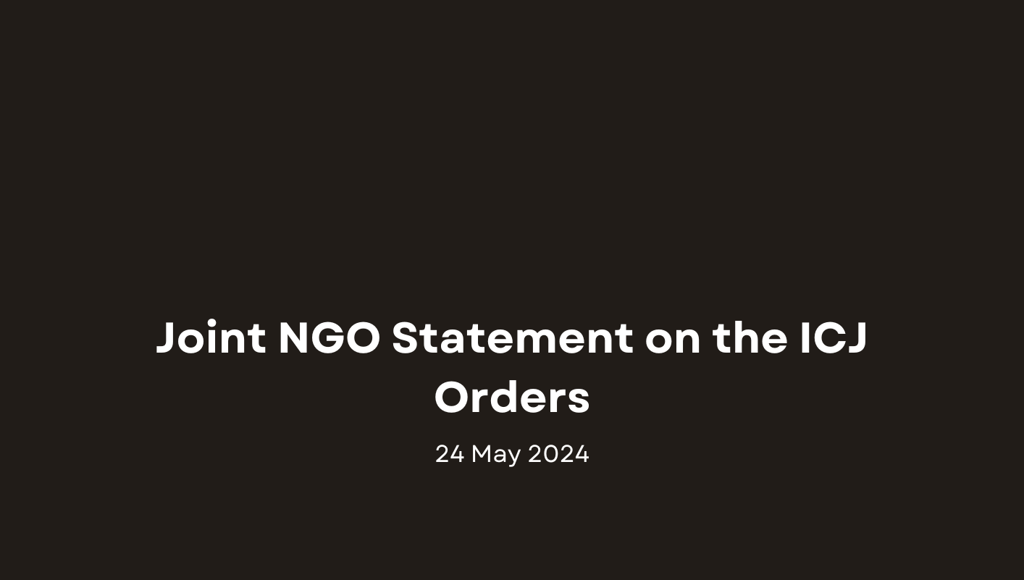
"As an aid worker in Gaza the current situation is deeply distressing. The feeling of
helplessness and frustration is overwhelming. Our primary mission is to help those in need,
but with the borders closed and no aid coming in, our hands are tied. We are acutely aware
of the worsening conditions and the urgent needs of people, and it is heartbreaking to
witness their suffering without being able to provide the necessary support."
On 24 May 2024, the International Court of Justice (ICJ) ordered additional provisional measures
regarding Israel’s alleged violations in Gaza of obligations under the Convention on the Prevention
and Punishment of the Crime of Genocide. The court ordered that, in light of the worsening conditions
in Rafah, Israel must immediately halt its military offensive, and any other action in the Rafah
governorate, which may subject the Palestinian population in Gaza to conditions of life that may lead
to their physical destruction, in whole or in part. The court described the conditions in Rafah as
‘disastrous’ and is ‘not convinced that the evacuation efforts and related measures that Israel affirms
to have undertaken to enhance the security of civilians in the Gaza Strip, and in particular those
recently displaced from the Rafah Governorate, are sufficient to alleviate the immense risk to which
the Palestinian population is exposed as a result of the military offensive in Rafah.’
The ICJ reaffirmed provisional measures indicated in its orders of 26 January 2024, and 28 March
2024, applicable throughout Gaza, including Rafah, and called for their immediate and effective
implementation. This includes the unhindered provision at scale of urgently needed basic services
and humanitarian assistance, and the maintained opening of land crossing points, particularly the
Rafah crossing. The Court also ordered Israel to allow unhindered access for any commission of
inquiry, fact-finding initiatives or other UN bodies to investigate allegations of genocide. It also
reiterated calls for the immediate and unconditional release of all hostages. Israel is required to
submit a report one month from today, outlining all measures taken to comply with these orders.
The UK must unreservedly accept the findings and orders of the Court. As a signatory to the
Genocide Convention and the UN Charter, the UK must ensure that the Court's decisions are
respected and enacted, by way of public statements and concrete policy actions. Failure to do so not
only risks further loss of civilian lives, it also risks unravelling the very foundations of the international
rules-based system and international justice. The application of justice and accountability for
international crimes can never be selective. Inconsistency enables impunity.
The situation in Gaza has deteriorated significantly, despite the ICJ’s 26 January order that Israeli
authorities must prevent and punish acts of genocide. Since 8 October, at least 35,000
Palestinianshave been killed, with thousands left under the rubble, and nearly 80,000 have been
injured. The population is being starved, with mass destruction of civilian infrastructure and little
access to clean water, sanitation and healthcare under Israel’s continued indiscriminate bombardment
and deliberate and systematic deprivation of aid in Gaza.
The UK must now do everything in its power to ensure that Israel complies with its obligations under
international law, including in respect of all of the measures ordered by the ICJ. The Israeli
government has already failed to comply with the ICJ’s orders, and the UK must urgently use every
available lever to ensure its compliance, urgently halt Israel’s assault on Rafah, and demand an
immediate and lasting ceasefire. This includes suspending arms transfers to Israel for as long as
there is a risk they may be used to violate international law. The UK must uphold its signatory
obligations under the convention to prevent and punish the crime of genocide, and must ensure that it
is in no way enabling, or otherwise complicit, in the commission of acts that the Court has found could
plausibly be in violation of the Genocide Convention.
We urge the UK to immediately reverse its decision to pause UK funding to UNRWA, which came
shortly after the issuance of the first set of provisional measures issued by the ICJ. We welcomed the
swift investigation by Catherine Colonna, which found that UNRWA has in place a significant number
of mechanisms and procedures to ensure compliance with the Humanitarian Principle of neutrality,
and by the UN Office of Internal Oversight Services (OIOS). The denial of funding to UNRWA will only
lead to more deaths, at a time when the ICJ has underscored the need to prevent genocide and fulfil
the dire humanitarian needs of Palestinians.
The ICJ is the highest court of the United Nations. His Majesty’s Government must publicly
and unreservedly acknowledge the findings of the ICJ and support implementation of the
measures it has ordered. Failure to do so will risk the UK falling short of its own ethical and
treaty obligations to prevent the crime of genocide, and its own stated policy to prevent all
mass atrocity crimes.
- Action for Humanity
- Action Aid UK
- Amos Trust
- Caabu (Council for Arab-British Understanding)
- CAFOD
- Christian Aid
- Embrace the Middle East
- Gender Action for Peace and Security (GAPS)
- Humanity First UK
- Interpal
- Lady Fatemah Charitable Trust
- Lawyers for Palestinian Human Rights
- Oxfam
- Omega Research Foundation
- Plan International UK
- Protection Approaches
- Medical Aid for Palestinians (MAP)
- Quakers in Britain
- SCIAF
- SOS Children’s Villages UK
- Welfare Association
- War on Want

